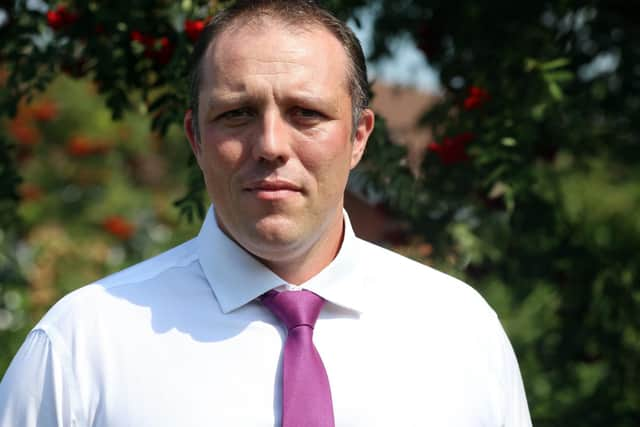Derbyshire's health boss warns Covid-19 restrictions could ease by March if rates fall
and live on Freeview channel 276
Director of public health at Derbyshire County Council Dean Wallace is urging communities across the county to continue following Covid-19 lockdown rules and hygiene practices – while even stepping up measures in some areas to ensure virus cases continue to fall.
The county’s health boss has recommended residents wear face coverings in busy, outdoor public places as well as inside, along with keeping at least a two-metre distance from people from different households and frequently washing their hands to control transmissions.
Advertisement
Hide AdAdvertisement
Hide AdHe has warned certain lockdown measures will need to be stepped up, along with public compliance in an attempt to control the new UK strain of the virus which has proven to be significantly more transmissible than the original Covid-19 variant.


"Our main weapon still in fighting this virus is public compliance and buying into what we are doing and I don't think there is any ideal solution", Derbyshire’s public health director Dean Wallace said.
"We need a massive chunk of the population to buy into it and comply to protect everybody, that is yourself, your loved ones and your community because my risk is your risk and your risk is my risk."
Since the new UK coronavirus strain which was first identified before Christmas, leading to a spike in in infections and our current lockdown, two other variants of the virus, from South Africa and Brazil have also been found.
Advertisement
Hide AdAdvertisement
Hide AdWhile Covid-19 cases are decreasing across Derbyshire as a whole, with 2,431 new infections detected in the seven days to January 27 – down by just over 20 percent from the week before, the rolling rate of 302.9 cases per 100,000 is still significantly higher than the country’s average.
The health boss added: "We've seen cases increase and come down more slowly after this lockdown and I think that is probably to some extent due to the new UK variant that we've been aware of that makes the virus more transmissible.
"In Bolsover around 91 percent of the cases now are from the new UK variant rather than the original strain of covid so that is one element.
"And we've seen that having an impact already and potentially that might mean a different normal moving forwards until we get a broader vaccination roll-out.
Advertisement
Hide AdAdvertisement
Hide Ad"Then the other two variants, South African and Brazilian, are probably more concerning from a public health perspective because it may have further implications in terms of having to vary the vaccination at some point in the future.
"Right now there is no indication that that strain is in Derbyshire whatsoever but we do have in large quantities across Derbyshire is the new variant of the UK variety - the one that was picked up prior to Christmas.
"What we need now is for people to be even more vigilant and be even more stringent in how they apply those measures to allow us to have a better chance of controlling this strain because doing what we did before doesn't appear to be enough to control it in the same way it could do originally.”
Chesterfield had 330 new virus cases in the most recently recorded week, a fall of 67 infections from the previous seven days with a rate of 314.6.
Advertisement
Hide AdAdvertisement
Hide AdBolsover was in a similar position, with 320 new cases – down from the week before but the area’s rolling rate of 397.2 infections per 100,000 people remains far too high.
Mr Wallace warned that rules could start to be eased in March if cases continue to steadily fall and people abide by the current measures.
"From a pure public health perspective getting towards the end of March we will be in a better position because of the vaccination roll-out and the weather will turn which will start to take us to a better place”, he commented.
"We are still going to have some sort of control measures in place as we move through this and potentially in summer, with people more outdoors, you will be able to get away with more.
Advertisement
Hide AdAdvertisement
Hide Ad"Then we will see what happens as we head into next winter so I can see a place where we get to a place in late spring and summer which is more what people consider to be 'normal'.”
He also said the government’s exit strategy out of the current lockdown will need to identify what is the ‘new tolerable level of the virus’ when it is released, as the roll-out of coronavirus vaccines will not be enough on its own to control the rate of transmissions.
"Looking at where we are now in the current situation, I can't see us getting back to where we were in August”, Derbyshire’s public health boss said.
"In August, we at one point had 32 cases in a seven day period and now we are on over 2,000 cases which is much better than we were with 3,500 a couple of weeks ago but still it is a significant number.
Advertisement
Hide AdAdvertisement
Hide Ad"At some point we are going to have a discussion around what is an acceptable rate in the community with covid secure measures around it and how do we look at operating in a new way, in terms of society at least in the short and medium term until we get a broader roll out of the vaccination.
"But test, trace, vaccinate is going to be a slogan that we are going to have to get used to and live with for some months and potentially years to come.
"The vaccination programme will get us into a better place but it is going to take time and things will get better throughout 2021 but it is not just going to be over and done just because we have the vaccines rolled out.”